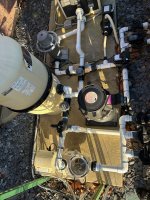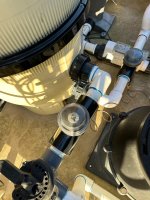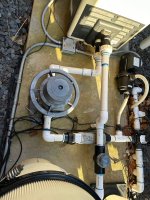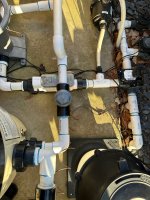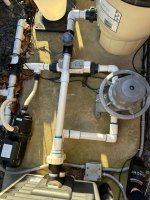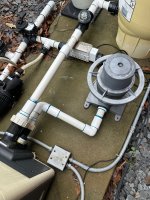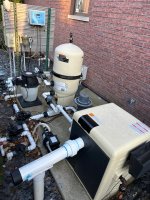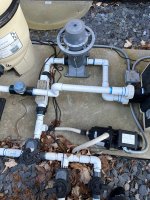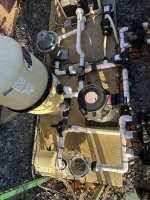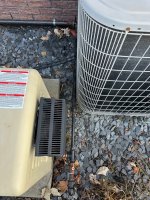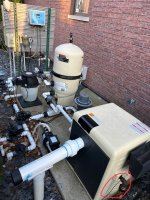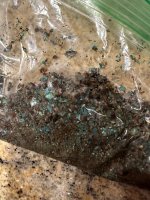- Oct 14, 2022
- 7
- Pool Size
- 13000
- Surface
- Vinyl
- Chlorine
- Salt Water Generator
- SWG Type
- Pentair Intellichlor IC-40
My pool is just over seven years old, and I'm on my second heater and fourth heat exchanger; initially, I thought I was not maintaining my levels properly, but now I am convinced something is very wrong and cannot find answers, so I'm looking for some opinions.
Saltwater pool with the Pentair Intellichem system; I take water to my pool company weekly; here are results from last summer (2023 tab):
Pool Chemistry Tracking
I started with a Pentair Mastertemp with the copper heat exchanger and went through three of them in four and a half years. So, I decided to get the Pentair Mastertemp with the cupro-nickel heat exchanger about 2 years ago, and I always test water at least weekly (results from last summer above). My pool company also installed two anodes to help prevent corrosion in the heat exchanger, and I've attached pictures of my setup. They just added the air intake on the side of the heater to see if that helps, they think it could be condensation forming on the exchanger causing corrosion.
After installing the cupro-nickel heat exchanger in 2022, I started noticing little copper/blue/green particles in my pressure side vacuum screen catchment, and i thought it was the anodes coming apart. It turns out it was the brand new cupro-nickel heat exchanger, and it went out after a little over a year. I had a new heat exchanger installed at the beginning of 2023, but the amount of copper coming through tells me it will leak very soon.
NOTES:
1) I know there is not a check valve between the heater and salt cell, my pump runs 24/7 at 2000 rpms so the pool company told me I do not need a check valve. I am going to have one installed anyway.
2) I have two anodes installed, and neither corrode at all, which should mean my water is stable and not corrosive.
3) I shut the system off 3-4 times a week to clear the basket, so water can back up into the heater at that time.
At this point, I'm wondering if having the heater so close to the air conditioner could be the issue?
I could be missing something with the water, but I cannot figure out what it possibly could be.
I'd love any/all theories people may have, as I just want to figure this out and not have to go through heat exchangers every 1.5 years.
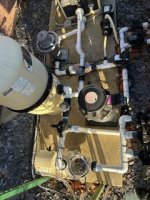
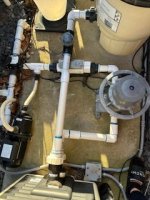
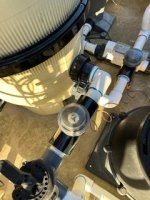
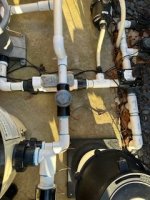
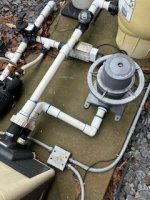
Saltwater pool with the Pentair Intellichem system; I take water to my pool company weekly; here are results from last summer (2023 tab):
Pool Chemistry Tracking
I started with a Pentair Mastertemp with the copper heat exchanger and went through three of them in four and a half years. So, I decided to get the Pentair Mastertemp with the cupro-nickel heat exchanger about 2 years ago, and I always test water at least weekly (results from last summer above). My pool company also installed two anodes to help prevent corrosion in the heat exchanger, and I've attached pictures of my setup. They just added the air intake on the side of the heater to see if that helps, they think it could be condensation forming on the exchanger causing corrosion.
After installing the cupro-nickel heat exchanger in 2022, I started noticing little copper/blue/green particles in my pressure side vacuum screen catchment, and i thought it was the anodes coming apart. It turns out it was the brand new cupro-nickel heat exchanger, and it went out after a little over a year. I had a new heat exchanger installed at the beginning of 2023, but the amount of copper coming through tells me it will leak very soon.
NOTES:
1) I know there is not a check valve between the heater and salt cell, my pump runs 24/7 at 2000 rpms so the pool company told me I do not need a check valve. I am going to have one installed anyway.
2) I have two anodes installed, and neither corrode at all, which should mean my water is stable and not corrosive.
3) I shut the system off 3-4 times a week to clear the basket, so water can back up into the heater at that time.
At this point, I'm wondering if having the heater so close to the air conditioner could be the issue?
I could be missing something with the water, but I cannot figure out what it possibly could be.
I'd love any/all theories people may have, as I just want to figure this out and not have to go through heat exchangers every 1.5 years.







